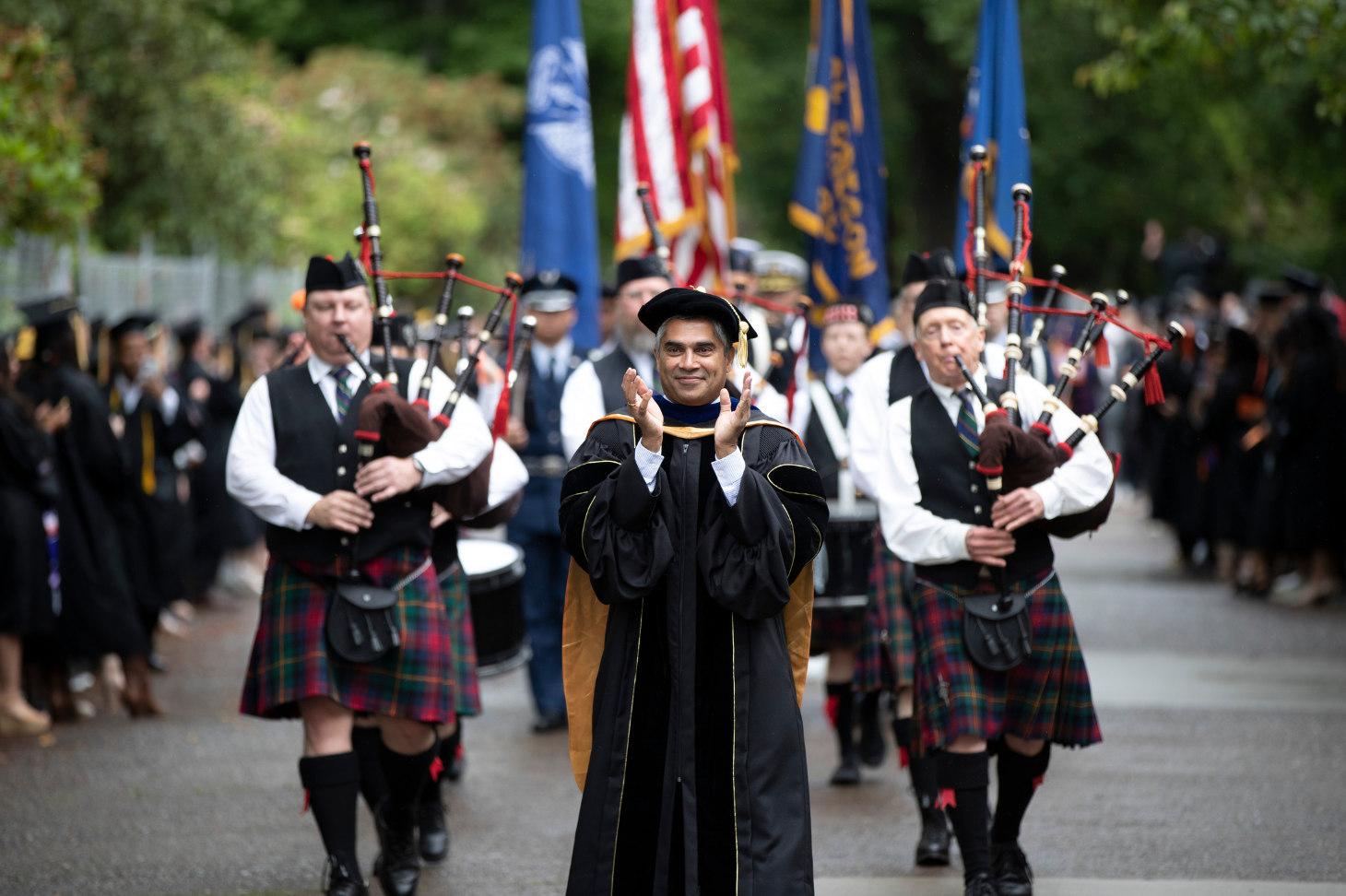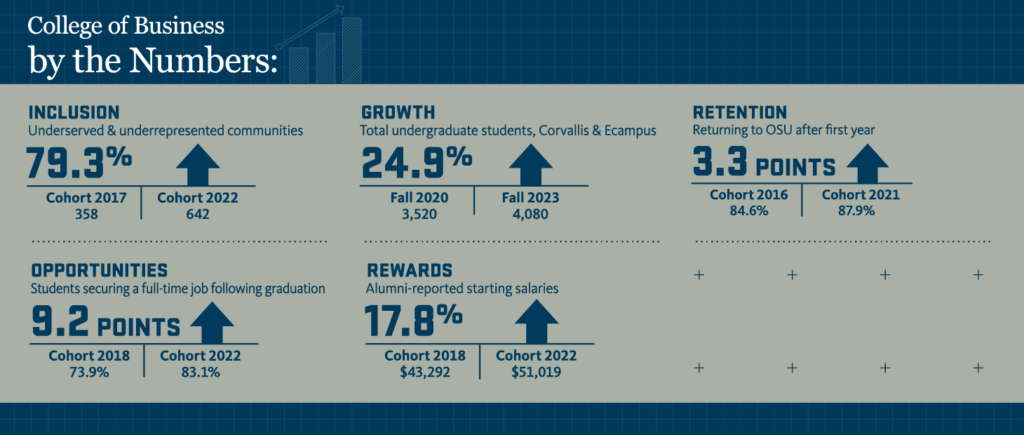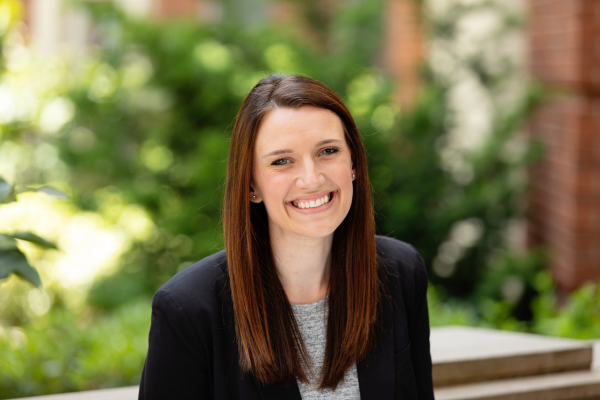News, articles, and interesting stuff from the College of Business
Building programs to fulfill a land grant mission
Prem Mathew grew up knowing the value of higher education. His parents, who graduated from high school but did not attend college, wove the message into their daily lives. The message resonated.

Prem Mathew is passionate about education. He and his team want to make it accessible for everyone.
Prem Mathew grew up knowing the value of higher education. His parents, who graduated from high school but did not attend college, wove the message into their daily lives.
The message resonated.
Mathew is the first generation in his family to attend and graduate college. He earned two bachelor’s degrees from the University of Pennsylvania and got an MBA at the University of Buffalo. He completed a Ph.D. in finance from the University of Missouri.
Now the associate dean for undergraduate student development in the College of Business and the founding director of the Center for Advancing Financial Education (CAFE), Mathew works to make sure all students can have the educational opportunities he did.
“I was privileged to have a family who understood the value of higher education and had the ability to support me financially through it,” Mathew said. “There is a substantial percentage of our student population who do not have that support now. Many of my efforts are centered on my background and what I translate the OSU land grant mission to be.”
For Mathew and his team, that means providing any Oregon student who wants a business education access to OSU. Crucially, it also means providing them with the means and assistance they need to stay in school, graduate and land a good job afterwards.
“If you look at what drives graduation and retention rates for students, it’s a sense of belonging and purpose, academic performance, and financial and mental wellbeing,” Mathew said. “Our initiatives are directly tied to those.”
Mathew and the College of Business’ student engagement and advising teams, which he leads, have created programs that are innovative and unique to Oregon and the region. They provide access to higher education and the tools students need to succeed.
The team’s K-12 programming introduces underrepresented students, who might not otherwise consider college, to OSU and higher education more generally, while giving them a foundational knowledge of the application and financial aid processes.
Initiatives like the Business Catalyst Scholars program and Bound for Business offer underrepresented, first-generation students scholarships as well as support geared toward their specific academic, developmental and social needs.
CAFE provides all OSU students with the financial education they need to make smart decisions in college and in life.
Building these programs has taken ingenuity, a true understanding of Oregon’s students, and support from the college, university, grants and donors.
“In some ways we’re lucky as well as intentional that we have all these processes in place,” Mathew said. “We have the structure and the personnel to build programs that allow us to address gaps in support. It has enabled us to increase our retention rates. That’s deliberate.”
Mathew’s guiding metric for the 2023-24 academic year is OSU President Jayathi Murthy’s goal to reach an 80% six-year graduation rate by 2030, roughly 10% higher than the current rate.
“Graduation rates are directly connected with retention,” Mathew said. “A lot of my focus starting this year is to firm up our first-year retention rate. Our goal is to raise retention to the extent that we are in line to meet the goal for our six-year graduation rate. One will lead to the other.”

To Mathew – and to Oregon State at large – providing access to higher education and a means to succeed for historically underrepresented populations is especially critical to fulfill the university’s land grant mission.
“Our access goal is to match the percentage of underrepresented students statewide, which is at about 25%,” Mathew said. “Five years ago, the percentage of the college’s undergraduate student population considered to be from underrepresented communities was about 10.7%. We were below the OSU percentage. Now, our most recent data, from fall 2022, showed that the college percentage has grown to 16%. We’re above the OSU marker. I’m really excited about that.”
According to Mathew, programs and initiatives like their K-12 partnerships, Business Catalyst Scholars and Bound for Business are starting to make a difference. “It’s getting the word out that we are a program that really supports these communities. I’m hoping to see our percentages increase.”
Marcella Flores, assistant director for student engagement, shares Mathew’s passion for OSU’s land grant mission to provide accessible education to all in Oregon.
Also a first-generation student while at Western Oregon University, Flores participated in a federal TRIO program, which provides support services for students from disadvantaged backgrounds.
“I had a really hard first year,” Flores said. “As a first-generation student, I had no idea what I was doing. But there were so many people and programs in place that helped me make it day-to- day and get to graduation.”
Flores is now paying it forward. In her position with the student engagement team, she helps coordinate the college’s K-12 programming as well as the Bound for Business program.
Outreach to younger, K-12 students helps them realize that college is possible and gives them a sound knowledge of the application process, and Bound for Business gives vulnerable first-year students the support they need to succeed.
Through grant and college funding, the student engagement team developed partnerships with the Boys and Girls Club of Salem as well as Hacienda in Portland. Both organizations are committed to providing vulnerable communities, especially school-age children, with educational support and life skills that will help them create future success.

Flores and the student engagement team developed Business Beavs in Action summer camps that focus on financial literacy, college readiness and social entrepreneurship for high schoolers involved in Hacienda and the Boys and Girls Club. They also participate in programs with campus partners who bring K-12 students to OSU for visits.
“Our K-12 work lends itself really well to the university’s land grant mission,” Flores said. “We’re proud that when a student comes to OSU and it’s their first time setting foot on a college campus, they’re seeing the opportunities that are available to them and what they could do if they got a degree.”
Flores, like Mathew, knows that for many first-generation and underrepresented students, the first year of college can often be the most challenging.
“It’s really the most critical time for us to know if a student is going to continue and get their degree,” Flores said. “Our goal is to retain 92% of students from their first to second years at the university. We were seeing that we weren’t retaining first- generation students at as high a rate as the rest of their cohort.”
That’s how Bound for Business was born.
Students who are invited into the Bound for Business program are first-generation and are academically vulnerable.
They get to move onto campus early with their cohort and receive mentorship. Those with financial need also receive scholarship support, and most critically they receive more individualized attention during their first year. For example, their sections for the college’s introductory class, BA 160 (BEngaged), are smaller, so that students, if they’re struggling, aren’t overlooked.
“The ability to really know our students, see what they’re going through and help them navigate those challenges has been amazing,” Flores said. “It’s a highlight of my career because it feels like something I’ve gotten to give back, because this is what folks gave to me.”
The Business Catalyst Scholars program serves underrepresented, high achieving students with financial need and provides them with extensive wraparound support services and development opportunities.
Started with the help of a seed gift from OSU Board of Trustees member Patty Bedient ‘75, the program offers prospective students a scholarship each year as well as guaranteed on-campus experiential learning opportunities. They also receive mentorship alongside a cohort of other scholars, a work-study job and career guidance.
“We know students in the Business Catalyst Scholars program don’t need a lot of academic support, but being first-generation students, they need to know how to navigate college and need to be provided experiences that optimize their academic career.” Mathew said.
Mathew’s goal is to open both Bound for Business and Business Catalyst Scholars to more students and further move the needle on retention rates.
“I’d love to see these programs have the funding and support to sustain themselves and grow,” he said. “Our higher goal is to bump up our retention rates and get to the graduation rate the president is looking for.”
CAFE is a way Mathew can reach all OSU students who want to learn more about their finances and how to manage paying for college.
This summer, CAFE was part of OSU’s Financial Readiness and Success program of which one component was to proactively outreach to all incoming OSU students. The goal: to introduce incoming students across the university to CAFE and offer these students an opportunity to meet with one of the center’s student workers to discuss their strategy for paying for college.
Of 6,500 incoming first-year students, more than 2,000 indicated an interest in CAFE, and nearly 300 have already set up appointments.
“A large percentage of students get here the first year, realize they don’t understand how much it costs, realize they don’t have the funds, then leave,” Mathew said. “We’re getting ahead of the issue and trying to make sure that the students are prepared when they’re here. I suspect that might move the retention needle a little bit, too.”
For Mathew, President Murthy’s graduation goals are ambitious … and motivating.
“We use all the information we have from our processes to create what’s going to be successful for all students, if they’re high-achieving or need more support,” he said. We are lucky, and we also know our mission.”